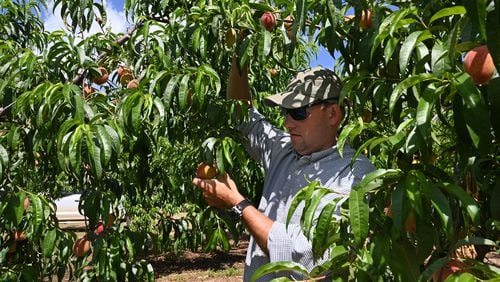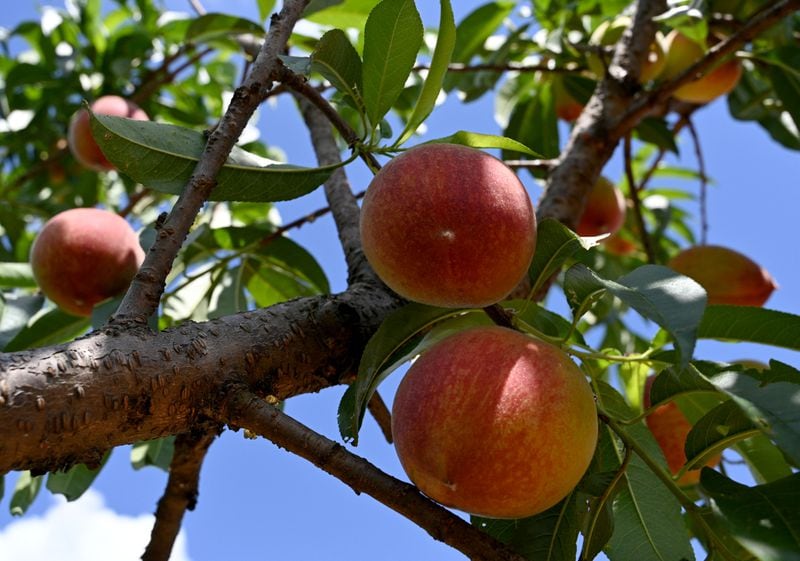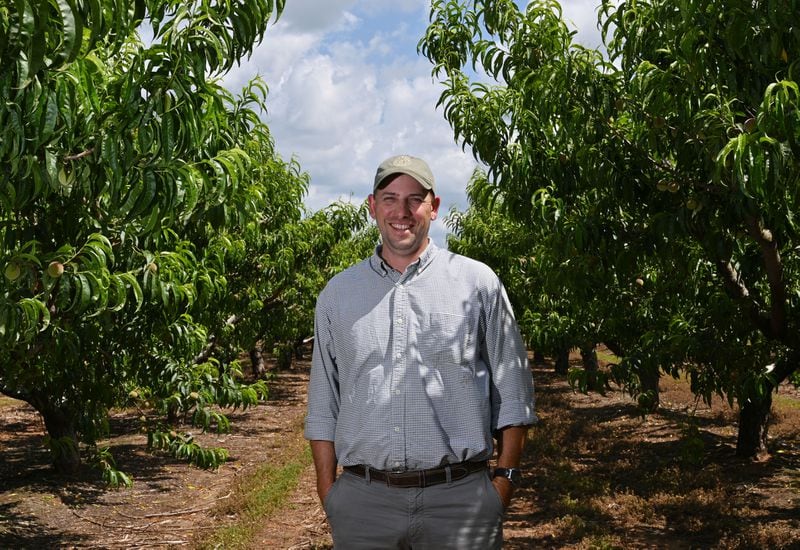In the 130 years Lawton Pearson’s family has been growing peaches in Middle Georgia, few harvests have been as disappointing as last year’s, when his crop — and most others in the state — were almost entirely wiped out by two March cold snaps.
Trees covered with quarter-sized fruit and delicate pink flowers were blasted by last year’s freezes, leaving the promise of an ample harvest to rot, prompting the federal government to declare a disaster across the heart of Georgia’s peach country.
But this year has been the “exact opposite,” Pearson said, giving farmers and fruit lovers across the Peach State reason to rejoice. Aided by a relatively cool winter and a deep freeze-less spring, Pearson said a “bumper” crop of Georgia’s trademark peaches should be heading to grocery stores and farmers markets soon.
“We’re all excited to tackle this beast of a crop that we get to pick,” said Pearson, a fifth-generation peach farmer and co-owner of Pearson Farm near Fort Valley, about 30 miles southwest of Macon.
The peach rebound was hailed by Georgia Agriculture Commissioner Tyler Harper who said “consumers in Georgia and across the country, can look forward to enjoying a great crop of our iconic Georgia peaches very soon.”
Agriculture remains Georgia’s top industry. Peaches aren’t Georgia’s most valuable agricultural product — that would be broiler chickens — nor is Georgia the nation’s top peach producer, having been surpassed long ago by California. But Georgia is still proudly known as the Peach State.
Credit: Hyosub Shin/AJC
Credit: Hyosub Shin/AJC
Peaches and blueberries, which are now the state’s most valuable fruit crop, both depend on a mix of hot and cold temperatures for successful harvests. But as human-caused climate change pushes average temperatures up in Georgia — especially in winter — it is disrupting the delicate balance plants and growers depend on. The result has been massive crop losses in recent years.
Peaches and blueberries need to spend a certain amount of time in temperatures between 32 and 45 degrees for healthy buds and fruit to emerge when warmer temperatures arrive. Conversely, an abnormally warm winter can trick plants to awaken from dormancy early, putting them at risk of damage if freezing temperatures return.
That’s exactly what doomed the state’s peach crop last year.
Egged on by Georgia’s warmest winter on record to start 2023, most peach trees in the state had full blooms or even small fruit out by mid-March, when back-to-back freeze events struck. The result was devastating — many peach growers lost 90% or more of their crop.
Georgia farmers also lost about 80% of their peach crops to a freeze in 2017, while the blueberry harvest of 2022 was also upended by a cold snap.
This year, the weather cooperated.
Temperatures from January to March were still 1.2 degrees warmer than the 30-year average, but they were a far cry from 2023′s exceptional heat, when average temperatures were 5.1 degrees above normal to start the year.
Winter’s chill did return briefly in mid-March, but most peach blooms survived unscathed.
“Because it wasn’t quite as warm this winter, it delayed the blossoming of the peaches,” said Pam Knox, an agricultural climatologist at the University of Georgia. Temperatures during the March freeze did not sink much below freezing, nor stay there for very long, which also aided growers, Knox added.
With the threat of a freeze in the rearview mirror as temperatures push into the 90s in parts of the state, farmers are preparing to harvest.
Credit: HYOSUB SHIN / AJC
Credit: HYOSUB SHIN / AJC
For the first time in years, Pearson said his staff is having to thin the crop to ensure their peaches grow as large and sweet as possible. Some shake their trees or hit branches with wiffle bats to knock the fruit loose. Others, like Pearson, prefer to pluck the unwanted fruit off by hand.
“When you have a full crop of peaches, it’s kind of a mountain to climb,” Pearson said. “Picking them is easy, but thinning them is the hard part.”
The expected bounty of peaches should also provide an economic jolt to rural Middle Georgia.
Selena Hall, the tourism specialist at the Byron Welcome Center just off Interstate 75 in Peach County, said late May and June — in the thick of the harvest — is always high season for visitors seeking their Georgia peach fix. She said many tourists still made the trek last year, but were greeted with few fresh peaches to choose from.
This year, she said “hopes are really high.”
“Once it gets started, it’s wide open until the end of the season,” Hall said.
Georgia’s blueberry crop, which is now worth an estimated $449 million, is in the thick of the harvest and is also poised for a big year, said Zilfina Rubio Ames, an assistant professor and small fruit extension specialist at UGA.
Ames said that after freeze events resulted in some down years for Georgia blueberries, this year’s full crop has brought some packing and shipping challenges. Competition from low-priced imports are causing some headaches, though Ames said she expects this will go down as a good season for Georgia’s blueberry industry.
Despite the bounce back in 2024, the future for Georgia’s fruit growers isn’t all peachy.
Average temperatures in the state are continuing to rise, especially in winter. That’s likely to continue causing problems for temperamental crops like peaches, Knox said.
To adapt to the warming climate, farmers like Pearson are playing “defense” by investing in huge fans and sprinkler systems that can protect crops in a freeze. At the same time, they are also working with breeders to develop new peach varieties better adapted to the warmer winters that are expected in the future.
After nearly all the peaches available in supermarkets last year came from California or overseas, Pearson said customers should begin to see the famed Georgia-grown fruit on shelves in the next couple of weeks.
“We feel like everyone is ready to go and ready to forget last year,” he said.
A note of disclosure
This coverage is supported by a partnership with Green South Foundation and Journalism Funding Partners. You can learn more and support our climate reporting by donating at ajc.com/donate/climate/









